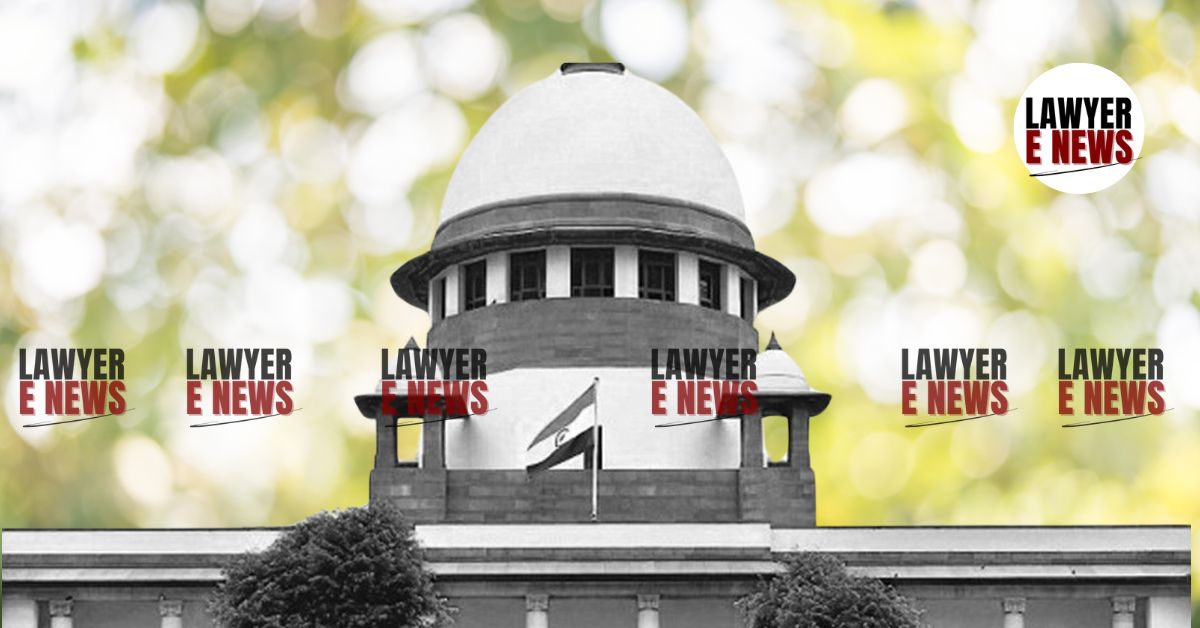-
by Admin
17 February 2026 4:27 AM



“Violation of Binding Precedents Is Contemptuous in Nature”: Apex Court Warns Madhya Pradesh Govt for Defying Earlier Rulings on Service Appraisals. Supreme Court of India, through a bench comprising Chief Justice B.R. Gavai and Justice Augustine George Masih, delivered a significant judgment in the matter titled In Re: Performance Appraisal Reports of the Officers of the Indian Forest Service (W.P. (C) No. 202 of 1995). The Court quashed a Government Order dated June 29, 2024, issued by the State of Madhya Pradesh, which had allowed IAS officers to participate in the performance appraisal process of Indian Forest Service (IFS) officers, in direct contravention of earlier judicial pronouncements.
The Court ruled that the Government Order was not only contrary to binding precedents but also bordered on contempt, stating:
“We have no hesitation to hold that the impugned G.O. is rather contemptuous in nature... it has been issued without even seeking clarification/modification of this Court.”
A Long-Running Legal Battle to Safeguard IFS Autonomy
The writ petition, originally filed in 1995 in the name of T.N. Godavarman Thirumulpad v. Union of India & Others, has become a continuing vehicle for judicial interventions in forest governance. The specific applications addressed in this judgment were filed by Gaurav Kumar Bansal, Unnamatla Prakasham, and the Indian Forest Service Association (State Unit), challenging the Madhya Pradesh G.O. dated June 29, 2024. The said G.O. prescribed a system under which District Collectors (IAS officers) and Divisional Commissioners were empowered to contribute to and influence the Performance Appraisal Reports (PARs) of IFS officers across various ranks.
The applicants argued that such interference was inconsistent with the principles laid down in earlier decisions, particularly Santosh Bharti v. State of Madhya Pradesh (2007) and State of Haryana v. P.C. Wadhwa, IPS (1987).
Can IAS Officers Evaluate IFS Peers?
The principal issue before the Court was whether officers from the Indian Administrative Service (IAS) could act as reporting, reviewing, or accepting authorities for officers of the Indian Forest Service (IFS), in matters of performance appraisal under the All India Services framework.
The bench examined Section 3(1) of the All India Services Act, 1951, as well as the All India Services (Confidential Rolls) Rules, 1970 and Performance Appraisal Report Rules, 2007. According to the statutory scheme and binding precedents, the Court reiterated that:
“The reporting authority must be a person higher in rank than the member of the Service… within the same department. This requirement is not just statutory—it is foundational to service discipline and accountability.”
The Government of Madhya Pradesh, represented by Solicitor General Tushar Mehta, attempted to justify the G.O. by arguing that Principal Secretaries and Additional Chief Secretaries, though from IAS, were officially superior to the Principal Chief Conservator of Forests (PCCF) in administrative hierarchy. However, the Court rejected this claim, noting that hierarchical superiority must be viewed in the context of the same cadre or department:
“Except for the PCCF, the reporting authority must be a superior officer from within the Indian Forest Service. It is only when there is no superior officer within the service that a non-IFS officer can be brought into the appraisal process.”
The bench emphasized that the precedent set in Santosh Bharti (2007) was binding, where it was held:
“Up to the rank of Additional Principal Chief Conservator of Forests (APCCF), the reporting and reviewing authorities must be immediate superiors from within the Forest Department.”
Madhya Pradesh G.O. is Illegal and Contemptuous
The Court noted with concern that despite multiple Supreme Court orders and clear directives from both the Ministry of Environment and Forests (MoEF) and the Department of Personnel and Training (DoPT), the State of Madhya Pradesh had issued a fresh Government Order without seeking clarification or modification.
Critically, the Court observed:
“The said G.O. being in violation of the directions of this Court is liable to be quashed and set aside.”
“We could have very well proceeded to initiate contempt proceedings against the officers responsible… however, we refrain ourselves from doing so.”
The Court also cited the CEC (Central Empowered Committee) report submitted in 2004, which had found that only Madhya Pradesh was violating the Supreme Court’s directives, whereas all other states had complied.
Further, the Court made it clear that even collecting evaluative notes from IAS officers like District Collectors or Divisional Commissioners was impermissible unless they were considered only as supplementary comments, and not integrated into the core appraisal structure.
Directions and Orders: Government of Madhya Pradesh Must Comply Within One Month
Concluding the judgment, the Supreme Court issued unequivocal directions:
“The impugned G.O. dated 29th June 2024 is held to be in violation of the order passed by this Court in the Santosh Bharti case… and is consequently quashed and set aside.”
Further, the Court mandated:
“The State of Madhya Pradesh is directed to reframe the rules by strictly adhering to the directions issued by this Court… within a period of one month.”
The bench appreciated the “fair stand” taken by the Solicitor General and the valuable assistance of Amicus Curiae Shri K. Parameshwar, stating:
“We place on record our appreciation for the efforts put in by Shri K. Parameshwar... and Shri Tushar Mehta for taking a fair stand.”
Reinforcement of Cadre Autonomy and Rule of Law
This judgment stands as a resounding reaffirmation of cadre autonomy in the Indian administrative structure, particularly in All India Services. It reiterates that governments—state or central—cannot bypass binding judicial pronouncements through administrative orders, and that interference across cadres without legal justification violates the core principles of service jurisprudence.
The decision also signals a stern warning to state governments: defiance of Supreme Court orders, especially in administrative governance, can invite serious consequences, including contempt.
Date of Decision: May 21, 2025
